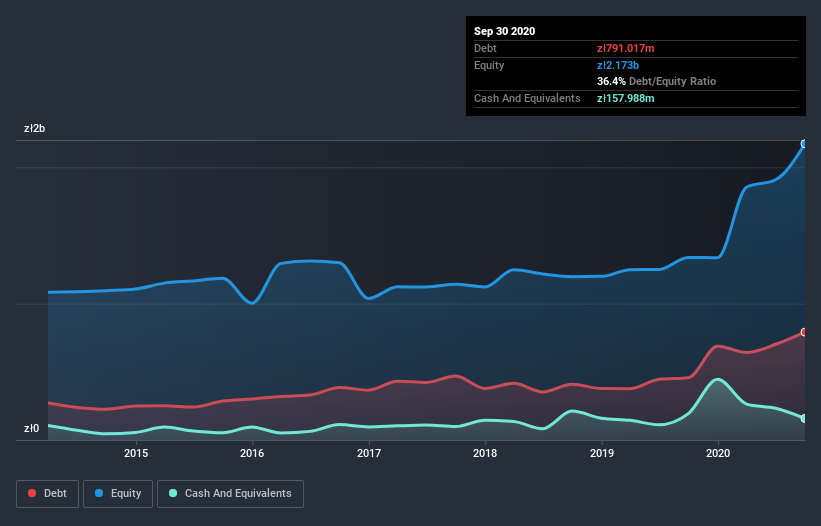These 4 Measures Indicate That Grupa Azoty Zaklady Chemiczne Police (WSE:PCE) Is Using Debt Extensively

Some say volatility, rather than debt, is the best way to think about risk as an investor, but Warren Buffett famously said that 'Volatility is far from synonymous with risk.' So it seems the smart money knows that debt - which is usually involved in bankruptcies - is a very important factor, when you assess how risky a company is. We can see that Grupa Azoty Zaklady Chemiczne Police S.A. (WSE:PCE) does use debt in its business. But should shareholders be worried about its use of debt?
When Is Debt A Problem?
Debt assists a business until the business has trouble paying it off, either with new capital or with free cash flow. Ultimately, if the company can't fulfill its legal obligations to repay debt, shareholders could walk away with nothing. However, a more frequent (but still costly) occurrence is where a company must issue shares at bargain-basement prices, permanently diluting shareholders, just to shore up its balance sheet. Having said that, the most common situation is where a company manages its debt reasonably well - and to its own advantage. When we examine debt levels, we first consider both cash and debt levels, together.
See our latest analysis for Grupa Azoty Zaklady Chemiczne Police
How Much Debt Does Grupa Azoty Zaklady Chemiczne Police Carry?
As you can see below, at the end of September 2020, Grupa Azoty Zaklady Chemiczne Police had zł791.0m of debt, up from zł457.1m a year ago. Click the image for more detail. On the flip side, it has zł158.0m in cash leading to net debt of about zł633.0m.

A Look At Grupa Azoty Zaklady Chemiczne Police's Liabilities
Zooming in on the latest balance sheet data, we can see that Grupa Azoty Zaklady Chemiczne Police had liabilities of zł1.03b due within 12 months and liabilities of zł998.1m due beyond that. Offsetting these obligations, it had cash of zł158.0m as well as receivables valued at zł270.7m due within 12 months. So it has liabilities totalling zł1.60b more than its cash and near-term receivables, combined.
When you consider that this deficiency exceeds the company's zł1.54b market capitalization, you might well be inclined to review the balance sheet intently. Hypothetically, extremely heavy dilution would be required if the company were forced to pay down its liabilities by raising capital at the current share price.
We use two main ratios to inform us about debt levels relative to earnings. The first is net debt divided by earnings before interest, tax, depreciation, and amortization (EBITDA), while the second is how many times its earnings before interest and tax (EBIT) covers its interest expense (or its interest cover, for short). The advantage of this approach is that we take into account both the absolute quantum of debt (with net debt to EBITDA) and the actual interest expenses associated with that debt (with its interest cover ratio).
Grupa Azoty Zaklady Chemiczne Police has a debt to EBITDA ratio of 3.7, which signals significant debt, but is still pretty reasonable for most types of business. However, its interest coverage of 1k is very high, suggesting that the interest expense on the debt is currently quite low. Grupa Azoty Zaklady Chemiczne Police grew its EBIT by 8.3% in the last year. That's far from incredible but it is a good thing, when it comes to paying off debt. When analysing debt levels, the balance sheet is the obvious place to start. But it is Grupa Azoty Zaklady Chemiczne Police's earnings that will influence how the balance sheet holds up in the future. So when considering debt, it's definitely worth looking at the earnings trend. Click here for an interactive snapshot.
Finally, a company can only pay off debt with cold hard cash, not accounting profits. So it's worth checking how much of that EBIT is backed by free cash flow. During the last three years, Grupa Azoty Zaklady Chemiczne Police burned a lot of cash. While that may be a result of expenditure for growth, it does make the debt far more risky.
Our View
We'd go so far as to say Grupa Azoty Zaklady Chemiczne Police's conversion of EBIT to free cash flow was disappointing. But on the bright side, its interest cover is a good sign, and makes us more optimistic. Overall, we think it's fair to say that Grupa Azoty Zaklady Chemiczne Police has enough debt that there are some real risks around the balance sheet. If all goes well, that should boost returns, but on the flip side, the risk of permanent capital loss is elevated by the debt. There's no doubt that we learn most about debt from the balance sheet. But ultimately, every company can contain risks that exist outside of the balance sheet. To that end, you should be aware of the 2 warning signs we've spotted with Grupa Azoty Zaklady Chemiczne Police .
If you're interested in investing in businesses that can grow profits without the burden of debt, then check out this free list of growing businesses that have net cash on the balance sheet.
If you’re looking to trade Grupa Azoty Zaklady Chemiczne Police, open an account with the lowest-cost* platform trusted by professionals, Interactive Brokers. Their clients from over 200 countries and territories trade stocks, options, futures, forex, bonds and funds worldwide from a single integrated account. Promoted
New: Manage All Your Stock Portfolios in One Place
We've created the ultimate portfolio companion for stock investors, and it's free.
• Connect an unlimited number of Portfolios and see your total in one currency
• Be alerted to new Warning Signs or Risks via email or mobile
• Track the Fair Value of your stocks
This article by Simply Wall St is general in nature. It does not constitute a recommendation to buy or sell any stock, and does not take account of your objectives, or your financial situation. We aim to bring you long-term focused analysis driven by fundamental data. Note that our analysis may not factor in the latest price-sensitive company announcements or qualitative material. Simply Wall St has no position in any stocks mentioned.
*Interactive Brokers Rated Lowest Cost Broker by StockBrokers.com Annual Online Review 2020
Have feedback on this article? Concerned about the content? Get in touch with us directly. Alternatively, email editorial-team (at) simplywallst.com.
About WSE:PCE
Grupa Azoty Zaklady Chemiczne Police
Grupa Azoty Zaklady Chemiczne Police S.A.
Good value with mediocre balance sheet.


